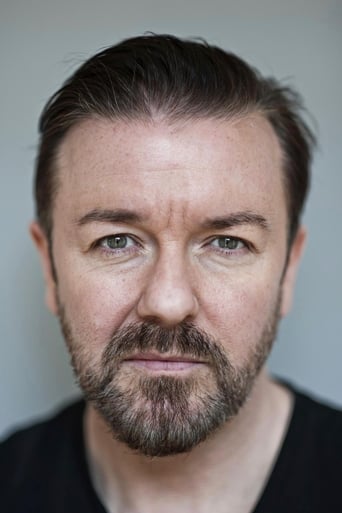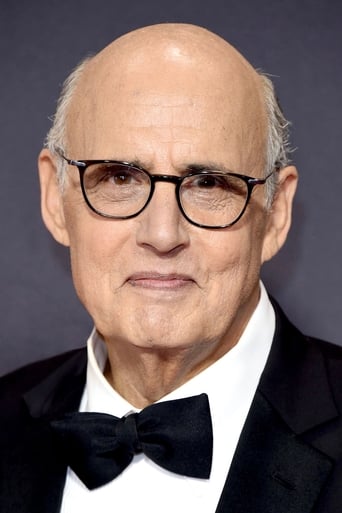gggm-96800
It's the kind of movie you'd watch if you just want to relax and not think about anything...unless if you're religious then you might get a bit bored/annoyed by the second half of the movie.The movie starts out so slowly, and the repetitive punchlines-about not being able to lie, as expected-just slow it down even more, while it did have some funny jokes they weren't laugh out loud worthy.If I were you I wouldn't buy The Invention of Lying unless you really like cameos, or anything Gervais related. But otherwise, just watch on Netflix while you still can.
benno-das
This film, if it can be called one, can be basically described as 'the awful invention of a script' to trash God and believers. The movie has been created by people with so little imagination that everyone keeps repeating two lines -- "short fat kids with stub noses" and "the man in the sky" countless number of times. I wonder how anyone can venture to make a movie with such limited imagination. It looks like an amateur attempt at movie making, completed in a few days with minimum people. Obviously, those behind the script, screenplay and direction have been gifted very little with creativity by "the man in the sky". If you have time to waste, please go try counting waves that lash on the beach. And if you have money to waste just put it through a paper shredder. But definitely, don't waste a nickel on this apology of a movie.
wantcoffee-94402
Be warned before watching this movie...I was excited to see this. The premise is original and fun. To its credit, the movie starts out delivering what it promises too, being very funny. However, the story takes a turn that you need to know about before you begin watching it.If you are OK with what I am going to tell you, then I suspect that you will be able to enjoy the movie. The theme of the movie is ANTI- Christian. It is an attack on the Christian faith...When watching this movie, I had to stop about half way through and do a Google search of the creator Ricky Gervais to confirm what I began to suspect by the way the story was unfolding. Gervais is an atheist. I read about how in his young life he came to reject Christianity due to his own experiences and even developed a strong hatred of Christianity.You can believe anything you like, Mr Gervais. But when you create a movie that attacks people's sacred beliefs, it should go without saying that you be up front and direct about it and NOT VEIL YOUR ATTEMPT TO CONVINCE THE AUDIENCE OF YOUR OWN BELIEFS as just a light-hearted comedy, you weaselly little man.
giligara30492
I loved this film for its ideas, its writing, and its characters.THE IDEASIn this film, Ricky Gervais imagines a very simple alternate universe: people have never evolved the ability to lie (or censor themselves). Throughout the story, needlessly said, it becomes much more complicated than that. First, he shows how dishonesty, when one man is capable of it, can be both morally bankrupt (inventing "The Black Plague," the fantastical, literally unbelievable story that makes him famous) as well as morally good (when he lies to the banker to procure a homeless man money), independently of the hugely suggestible nature of everyone else on this film. This immediately has real-world resonance.Second, I admired the clever, satirical, but overall succinct way he dove into the birth of religious faith (in this case contextualised as the Judeo-Christian faith): a grieving man, Mark, who doesn't want his agonising mother to be afraid of death, does a very human thing, which no one in this universe has been capable of doing before. He tells her a lie, invents heaven, for both their comforts. Now, the brilliant bit is that it doesn't feel like satire at all at this point: it feels real. Like this is a very probable hypothesis to explain why the concept of heaven arose. And I must agree with Ricky on this.The invention, of course, goes further. When Mark is pushed into explaining what he knows and how, though (funny how even gullible people seem to need some sort of evidence), he is backed against a wall with the whole of the human race patiently waiting on him, and comes up with "The Man In The Sky" (TMITS). The man who controls everything and both gives people cancer and cures them, capsizes boats and saves the drowning man. If it seems a half-arsed concept, is because, to Ricky, and most atheists like myself, it is. I would imagine the hilarious satire here is clumsy at best in the eyes of a theist, but, really, Ricky does a fantastic job of pinning down both the atheist take on the moral argument (people immediately need guidance on good and bad when faced with the knowledge of TMITS, when they haven't needed it for the whole of human evolution)as well as the problem of evil (TMITS "is kind of a good guy, but he's a prick, too"). In this universe, the rise of churches and diverging doctrines and everything else, of course, is not far off after the initial "discovery" of TMITS. Also funny how Mark creates hell out of basic annoyance at the people pressing him for answers.Finally, I thought another well-put idea of the film is that whilst morality is complex, and people can and do use lies for personal gain and for altruistic purposes, morality is ultimately and foremost, a human construct. Mark, for example, could have easily convinced Anna to get together romantically with him by answering "yes" when she asked him whether being rich and famous would affect the genetic material of their potential offspring. He could have said to Frank, his suicidal neighbour, that he thought him truthfully a loser. But he doesn't. His reaction is "no" to the first, and "killing yourself is a bad idea; let's hang out" to the second. Also, he's intellectually honest in another respect that makes him different from seemingly everyone else in the film: he allows himself to seek out the truth about people in depth, beyond their appearances. And since there is no external morality (TMITS is merely Mark's invention), these moral things he does must be a product of his human empathy, his sense of compassion, his recognition of sentience outside ourselves deserving of respect. It's a human construct.THE WRITINGNot much to say here. Ricky's smart-arse wit was there throughout. The callousness and hilarity of the truths and the absurdity of the lies was very well done.THE CHARACTERSMark Bellison (Ricky Gervais) is a mercilessly advantageous, cunning bastard who's also kind and compassionate. I like him. Anna McDoogles (Jennifer Garner) is a superficial girl who grows throughout the film by getting to see beyond appearances. She ends up giving Mark a chance and finding out that she does like him for him after all. I liked their relationship, too.I suggest watching if you like wit, satire, and thoughtful comedy. It could have been nonsense, but Ricky's way too smart for that -- he made it mean so much more than its premise. A testament to the effectiveness of simplicity.






